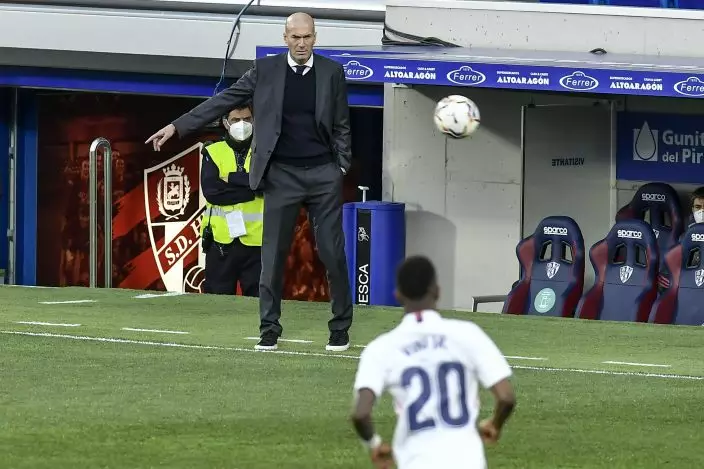The Champions League is set to grow bigger and richer amid fears Europe’s mid-ranked soccer nations could be even worse off as a result.
UEFA will update 55 national member federations on Tuesday on its plan to revamp the Champions League in 2024, adding four teams and 100 more matches each season.
Rewarding the elite brings risks lower down the ranks.

Bayern's Robert Lewandowski, left, celebrates after scoring during the German Bundesliga soccer match between FC Schalke 04 and Bayern Munich in Gelsenkirchen, Germany, Sunday, Jan. 24, 2021. (Leon KuegelerPool via AP)
How to allocate those extra entries — to champions of less wealthy countries or storied clubs based on past success — and billions of euros (dollars) in expected new commercial revenue are key targets for the 30-nation European Leagues group.
“There is a risk that they’re going to be isolated,” European Leagues President Lars-Christer Olsson said of UEFA members who have an online meeting Tuesday.
UEFA will detail a 36-team Champions League proposal starting in three years’ time with a variation of the “Swiss system” format. Final agreement by UEFA’s executive committee is likely before the 55 members meet on April 20 in Switzerland.

Real Madrid's head coach Zinedine Zidane gives instructions from the side line during the Spanish La Liga soccer match between Huesca and Real Madrid at El Alcoraz stadium in Huesca, Spain, Saturday, Feb. 6, 2021. (AP PhotoAlvaro Barrientos)
Teams would face 10 different opponents and rank in a single league table, replacing the traditional group stage of six games against just three opponents. It would feed into the knockout stage starting with a new playoff round to complete the last-16 bracket.
It fufils long-time demands by clubs in top-ranked countries for more UEFA prize money and brand-building exposure by playing more games against each other.
The UEFA proposal has 225 games instead of the current 125-game format that this year shares almost 2 billion euros ($2.3 billion) in UEFA prize money among 32 clubs.
UEFA has shaped its plan amid leaks that some clubs led by Real Madrid are working with financiers on an elitist 20-team Super League with 15 permanent members. A “G15,” Olsson suggested.
Now European Leagues hopes UEFA’s lower-ranked member associations push for agreements that protect their title winners and national teams.
“I hope more and more associations understand what is happening,” Olsson, a former UEFA chief executive, told The Associated Press in a telephone interview.
Olsson cautioned that adding four Champions League midweeks to the busy European autumn schedule could see clubs pressure players to skip international call-ups. National team games are key to prestige and revenue for most UEFA member federations.
Domestic cup competitions, typically organized by national associations, also face conflict from expanding UEFA competitions.
The leagues’ concern is fueled by how Champions League reform talks in 2016 favored the European Club Association.
The big-4 leagues in Spain, England, Germany and Italy each got a guaranteed fourth place in the group stage. That squeezed champions from countries like the Netherlands, Croatia and Denmark which enter the qualifying rounds.
Prize money was skewed toward teams based on their historical European record — the so-called “coefficient ranking” that also helps decide group-stage seedings.
Coefficients are back in play, with top clubs hoping this league table can decide the extra Champions League entries in 2024. It would reward previously successful teams whose domestic season only earned a place in the Europa League or the third-tier Europa Conference League that launches next season.
Arsenal would have been rewarded by such an entry system in each season since its last Champions League game in 2017. Chelsea and Sevilla would also have benefited.
“For me, it’s a principle that the historic coefficient should not be part of an international competition at all,” Olsson said, suggesting it would effectively lock in teams with a current top-15 ranking. “We will have a de facto closed Champions League.”
He noted progress by emerging clubs like Atalanta, Leicester and Leipzig in the past five years. At the same time, AC Milan, Arsenal and Schalke stopped being Champions League regulars.
The leagues do not oppose all proposed changes. Olsson cited giving a guaranteed third place to the fifth-ranked nation, currently France, and generating interest by playing so many different opponents.
However, the leagues’ core aim is opening the Champions League to more countries, making its members’ competitions more vibrant and avoid widening the wealth gap in European soccer.
“It also gives incentives to other clubs in domestic competitions to really make an effort to reach the top,” Olsson said.
The way UEFA stakeholders with competing interests came together during the pandemic shutdown last year gives the veteran official hope.
“It has shown that unity works,” he said.
More AP soccer: https://apnews.com/hub/soccer and https://twitter.com/AP_Sports


